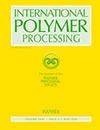Effect of processing conditions on the rheological and mechanical properties of composites based on a PBS matrix and enzymatically treated date palm fibers
IF 1.9
4区 工程技术
Q4 ENGINEERING, CHEMICAL
引用次数: 1
Abstract
Abstract The rheological properties of biocomposites can change depending on the polymer, fiber type, fiber size and processing conditions. In this work, biodegradable PBS composites filled with raw and enzymatically treated date palm fibers were processed using an internal mixer. The influence of the processing conditions, namely filler concentration, rotor of the mixer rotational speed, as well as the type of the enzymatic fiber treatment on PBS (Poly Butylene Succinate)/date palm fiber composites were studied by measuring the torque and the temperature in real time during melt processing. A rheological analysis was also carried out by performing time and multi-wave-frequency sweeps. It was found that the stabilization torque increased with increasing fiber loading and rotor rotational speed, indicating a higher viscosity. An enhancement of the melting process occurred with modified fibers, which was explained by the decrease in the fiber diameter, denoting cellulose micro-fibrils separation by enzymes action. These composites were characterized by a better thermal resistance and mechanical stiffness compared to those based on raw fibers at the same loading rate.加工条件对PBS基与酶处理椰枣纤维复合材料流变学和力学性能的影响
摘要生物复合材料的流变性能会随着聚合物、纤维类型、纤维尺寸和加工条件的不同而变化。在这项工作中,使用内部混合器处理了填充有生的和酶处理的椰枣棕榈纤维的可生物降解PBS复合材料。通过实时测量熔融加工过程中的扭矩和温度,研究了填料浓度、搅拌器转子转速以及纤维酶处理方式等工艺条件对PBS(聚丁二酸丁二醇酯)/椰枣纤维复合材料的影响。还通过进行时间和多波频率扫描进行了流变学分析。研究发现,稳定扭矩随着纤维负载和转子转速的增加而增加,表明粘度更高。改性纤维的熔融过程增强,这可以通过纤维直径的减小来解释,表明纤维素微纤维通过酶的作用分离。与相同加载速率下基于原纤维的复合材料相比,这些复合材料具有更好的耐热性和机械刚度。
本文章由计算机程序翻译,如有差异,请以英文原文为准。
求助全文
约1分钟内获得全文
求助全文
来源期刊

International Polymer Processing
工程技术-高分子科学
CiteScore
2.20
自引率
7.70%
发文量
62
审稿时长
6 months
期刊介绍:
International Polymer Processing offers original research contributions, invited review papers and recent technological developments in processing thermoplastics, thermosets, elastomers and fibers as well as polymer reaction engineering. For more than 25 years International Polymer Processing, the journal of the Polymer Processing Society, provides strictly peer-reviewed, high-quality articles and rapid communications from the leading experts around the world.
 求助内容:
求助内容: 应助结果提醒方式:
应助结果提醒方式:


